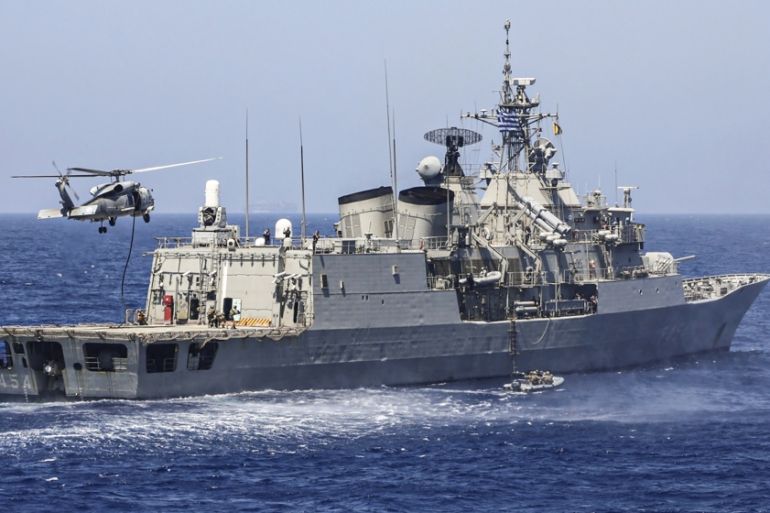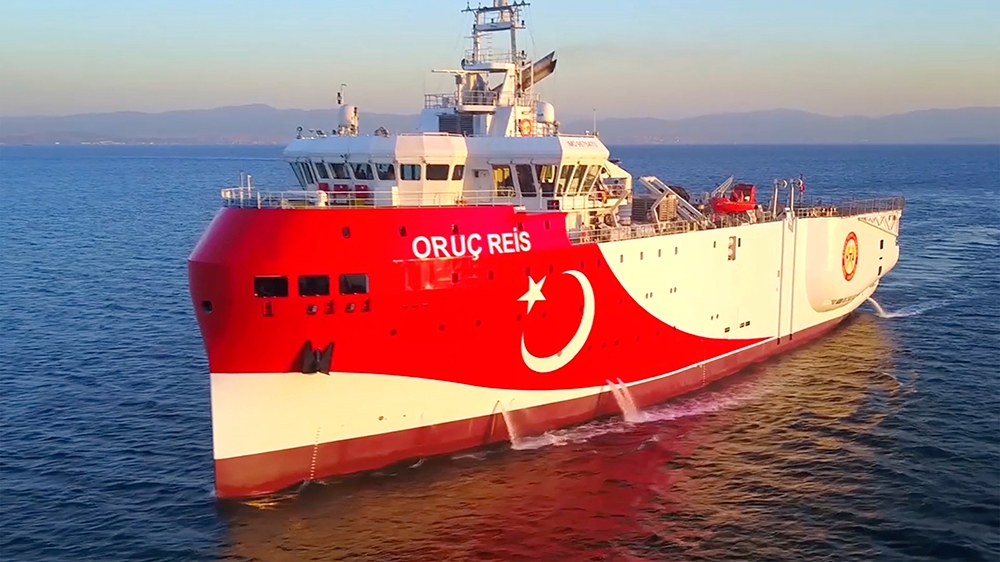Turkey open to Mediterranean Sea talks but ‘determined’: Erdogan
Turkish leader promises to continue to implement ‘a decisive and active’ policy in the eastern Mediterranean Sea.

Turkish President Recep Tayyip Erdogan said on Wednesday Ankara was open to “constructive” talks but would remain determined in its eastern Mediterranean standoff with Greece.
Erdogan made the comments in a videoconference call with German Chancellor Angela Merkel before an EU summit next week, at which the bloc will discuss imposing sanctions on Turkey over its search for energy in waters claimed by Cyprus and Greece.
Germany has taken the lead in trying to mediate an end to a conflict that has seen the two NATO neighbours stage rival air and sea drills in strategic waters between Cyprus and Crete.
|
|
The Turkish presidency said Erdogan told Merkel the dispute “could be resolved through negotiations … provided that a constructive approach, based on fairness, prevails”.
Erdogan “underscored he will continue to implement a decisive and active policy with regard to Turkey’s rights”, his office said.
Turkey says the EU unfairly backs Greece in a maritime dispute that stretches back decades, but which gained added importance with the discovery of large natural gas deposits in recent years.
‘Continue our operations’
The standoff appeared to be cooling off when Turkey’s Oruc Reis research vessel and its accompanying fleet of warships ended their month-long mission near a Greek island and pulled back to shore last weekend.
But Turkey stressed the vessel was only undergoing planned maintenance and would soon continue its exploration in the eastern Mediterranean Sea.
Foreign Minister Mevlut Cavusoglu told broadcaster CNN Turk on Wednesday that Oruc Reis’s maintenance may take “a few weeks”.
“Once maintenance is finished, we will continue our operations with determination,” he said.
The Turkish navy on Tuesday also announced the extension of the Yavuz drillship’s stay in disputed waters near Cyprus until October 12.
On Wednesday, the EU urged Turkey to remove the Yavuz from the area in the way that it moved the Oruc Reis.
“The recent withdrawal of the research vessel Oruc Reis is an important step paving the way for a meaningful dialogue between Greece and Turkey. The EU also calls for a similar decisions as concerns Cyprus,” said a spokesperson for the bloc’s diplomatic chief Josep Borrell.
“There is an opportunity to pursue immediate de-escalation and resume dialogue and negotiations, which is the only path towards lasting solutions,” he added.

‘Blackmail and threats’
Greece’s Prime Minister Kyriakos Mitsotakis said on Wednesday he was concerned by Turkey’s move to extend the operation of its Yavuz energy drillship in disputed Mediterranean waters.
“Turkey has a choice – engage with Europe in a constructive way or continue its unilateral actions and face consequences,” he said in an interview with the Economist.
The Turkish and Greek war games have drawn in EU powers and even the naval assets of the United States and the United Arab Emirates.
NATO is hosting periodic rounds of technical talks aimed at opening up channels of communication that could keep Greece and Turkey from accidentally going to war.
|
|
Their two navies’ warships collided on August 12 in an incident that prompted Erdogan to warn Greece of a “heavy price” to pay were Turkish ships ever attacked.
European Commission President Ursula von der Leyen said on Wednesday nothing could justify the intimidation of Greece and Cyprus by Turkey.
Cyprus, meanwhile, said it is ready to talk to Turkey to resolve differences but only “without blackmail and threats”, its president said on Wednesday.
“Nicosia has been always ready for a dialogue but for that … to be effective, it needs to be clearly defined based on international law, without blackmail or threats,” Cypriot President Nicos Anastasiades said after talks with European Council President Charles Michel, who chairs EU summits.
Anastasiades said Turkey’s move to extend the Yavuz drillship’s operations came at a time when the EU, of which Cyprus is a member state, was trying to reduce tensions.
EU leaders will look for ways to defuse tensions at the summit on September 24-25.
“In view of the EU Council meeting next week, we underscored the importance of staying united on the messages [to Turkey] and determined to implement our decisions if the illicit actions continue,” Anastasiades said.
Turkish Deputy Foreign Minister Faruk Kaymakci told an online panel on EU-Turkey relations the operations were in response to “unilateral actions” by Greek Cypriots and Greece.
“This is not an intimidation, this is just to say that Turkey will continue to defend its own rights and also the rights of Turkish Cypriots,” Kaymakci said.
Cyprus was split in two after a 1974 Turkish invasion in response to a brief Greek-inspired coup. Turkey recognises the breakaway Turkish Cypriot state in the north, but not the internationally-recognised Greek Cypriot government.
The government has long been at loggerheads with Turkey, which began drilling for oil and gas near Cyprus last year.